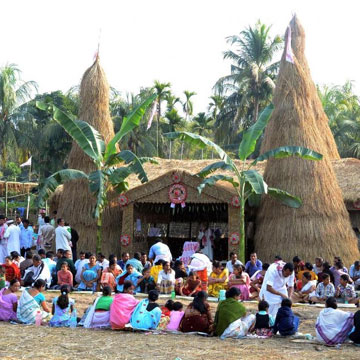 Guwahati:
Guwahati: With the mercury dipping, people in Assam, particularly in the rural areas, are switching to celebration mode with the Na Khowa festival, an age-old ritual of community feasts organised to thank the gods for a good harvest.
The Na Khowa festival is essentially a prelude to Bhogali Bihu or Magh Bihu, the state's annual feasting festival. While some families organise it individually, in some places several villages come together to boost harmony among communities.
Six villages of the greater Demow area in Upper Assam's Sivsagar district have come together to participate in Na Khowa on Saturday. The organisers expect that over 1,800 people, including men, women and children ,will participate in the community feast.
"All the 4,000 households in six nearby villages are joining together this year in Na Khowa. It is a great occasion after a long time. We have instituted a committee so that all arrangements are made smoothly for the function," Thaneswar Bora of No.2 Lahi Morongial village, told IANS.
He said despite floods and an attack of what are coloqually called "army worms" in the paddy fields this year, the harvest was comparatively good and so it was time to thank the gods and celebrate with the community.
Na Khowa has been a tradition in their village for a long time. "However, due to some problems in the recent past, it was not observed every year. The youth of the village have taken the initiative this year and coordinated with neighbouring villages," said Suresh Baruah, a teacher of the village.
"Modernisation has changed lots of things in our society. We are forgetting our cultures and traditions due to the increasing complexity of modern lives. It is a welcome step on the part of the youth of the village not only to revive the old tradition but also increase people-to-people contact among the communities," Baruah explained.
Each household in the six villages has contributed for the feast, be it rice, vegetables, ducks, fish or the myriad other items required. The menu includes rice from newly-harvested paddy, dal, mixed vegetables, duck curry with gourd, fish curry with elephant apple, mashed potatoes and much more.
Also to be distributed is "saaj", the traditional rice beer collected from every household.
"We are going to celebrate it as per the tradition. First the elders of the community will offer the food to the gods and we would pray to our forefathers for showering their blessings on us so that peace and prosperity prevail. Then we will distribute the food among the community. There will also be some cultural events like singing and dancing for fun and merrymaking," Baruah added.
"Since centuries people of the villages in Assam have been farming together with help from each other. In some villages, the residents go from one field to another to harvest and it is done as a community responsibility," Dwijen Sharma a professor at Shillong's North Eastern Hill University (NEHU), told IANS.
"Na Khowa is not only a thanksgiving function from the community to the gods but also one of the most important factors that strengthen the understanding and bonds among the community, which has been continuing for generations," Sharma said, adding that although modernisation has changed a lot of things, "it is good that some societies still celebrate traditions like Na Khowa".
# Aditya Baruah can be contacted at aditya.assam@redifmail.com
 Guwahati: With the mercury dipping, people in Assam, particularly in the rural areas, are switching to celebration mode with the Na Khowa festival, an age-old ritual of community feasts organised to thank the gods for a good harvest.
Guwahati: With the mercury dipping, people in Assam, particularly in the rural areas, are switching to celebration mode with the Na Khowa festival, an age-old ritual of community feasts organised to thank the gods for a good harvest.